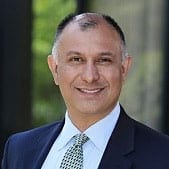Has wearing a facemask caused you to change the way you breathe? Unless you’re a professional painter or a doctor, you’re probably not used to wearing a facemask at all, let alone for extended periods of time. As a result, you’ve probably accidentally started breathing out of your mouth instead of your nose. Many people find that mouth breathing while wearing a mask is more comfortable, but your dentist in Ramsey wants you to know that this type of breathing can have an unwanted, stinky side effect.
But First, An Important Note
We promise to get into the stinky details of mouth breathing in a minute, but first, we need to say that the potential oral health side effects of facemasks do not outweigh their protective benefits. We are not suggesting you stop wearing a mask. We promise to give you some tips at the end of this blog to help you avoid the side effects we discuss. Please continue to wear a mask in public and maintain social distancing.
Now, Back to the Show!
Ok, now that that’s out of the way, let’s talk about mouth breathing and smelly breath. If you’re not normally a mouth breather, you may not quite realize the dry mouth feeling we’re referring to. Let us help. Think back to last time you had a stuffy nose and you had to breathe out of your mouth. Do you remember how dry your mouth was? How uncomfortable it felt? That’s dry mouth, and some people have it all of the time. It’s also what can happen if you breathe out of your mouth instead of your nose, with or without a facemask. It’s also what concerns your dentist in Ramsey.
Mouth Breathing & Bad Breath
When we breathe using our mouths instead of our noses and we start to experience that dry mouth feeling, it’s because all of our saliva has dried up. In fact, dry mouth can even prevent more saliva from being produced. Why does this matter? Well, a healthy mouth needs a constant flow of saliva as it helps rinse away bacteria. Without saliva, these bacteria are left free to feed on food leftovers. When they’re done eating, they release a stinky byproduct. That’s what we smell when we get a whiff of bad breath. But as your dentist in Ramsey knows, bad breath isn’t the only thing that can happen as a result of mouth breathing.
Dry Mouth & Cavities
Remember how we said we need saliva to help remove bad breath bacteria? Well, we also need saliva to neutralize acids in the mouth. If those acids are not neutralized, they can eat away at tooth enamel, weakening this protective barrier. This makes it easier for bacteria to wiggle in and cause cavities.
Preventing Dry Mouth
As we promised earlier, there are things you can do to prevent dry mouth. Now, the best way to keep dry mouth from happening is to dry your best to breathe in and out of your nose. But if you’re not comfortable doing that while wearing a mask, try some of the following tips.
- Chew Gum. Chewing gum that contains Xylitol can help jumpstart saliva production and keep it flowing. Sucking on sugarless hard candies can also have a similar effect.
- Drink Water. We should all drink water throughout the day, at least eight 8 ounce glasses is the minimum recommendation. But if you’re at risk for dry mouth or already have dry mouth, drinking more water can help rehydrate the mouth and rinse away bad bacteria and neutralize those dangerous acids.
- Brush Regularly. Make sure that you brush your teeth twice a day to help further remove bacteria and leftover foods. It’s also important to floss once a day to clean areas a toothbrush can’t reach.
It doesn’t appear as facemasks are going away any time soon. So while they’re here, make sure you protect your oral health by trying to consciously breathe out of your nose or try the tips above to help keep your mouth moist and stink-free. Of course, if you have questions about dry mouth, call your dentist in Ramsey to schedule an appointment.
